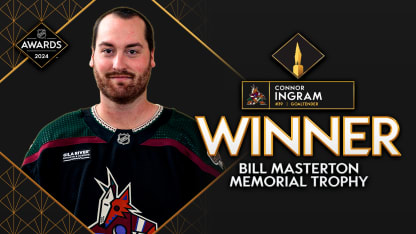Connor Ingram won the Bill Masterton Memorial Trophy on Wednesday. The award is presented annually to the NHL player who best exemplifies the qualities of perseverance, sportsmanship and dedication to hockey as voted on by members of the Professional Hockey Writers Association.
Ingram, a goalie for the Arizona Coyotes this season, nearly retired due to obsessive compulsive disorder and lingering depression before seeking help from the NHL/NHLPA Player Assistance program Jan. 15, 2021.
“I think this is a job that not a lot of people get to do, and I put 22 years of my life into it and thought I might as well keep going at this point," Ingram said Wednesday. "Lucky for me, I got a shot in Nashville and I got a shot in Arizona to keep it going, so I’ll be forever grateful to hockey and the hockey world for helping me through it.”
Ingram played his first seven professional seasons in the ECHL, American Hockey League and Sweden before making his NHL debut with the Nashville Predators in 2021-22. The 27-year-old, who was claimed off waivers by the Coyotes on Oct. 10, 2022, was 23-21-3 with a 2.91 goals-against average, .907 save percentage and tied for the NHL lead with six shutouts in 50 games (48 starts) this season.
He became this first Coyotes goalie in 12 years to be named the NHL's First Star for the week ending Dec. 3, when he was 3-0-0 with a 1.63 GAA and .947 save percentage during a stretch when Arizona won four straight games against the previous four Stanley Cup winners.
A first-time finalist, Ingram shared his story with NHL.com staff writer Amalie Benjamin in the hopes of helping others.
"You've got to put the work in to feel good," Ingram told NHL.com earlier this season. "You know what sets you off or what makes you calm, whatever it may be. It's like addiction. You know if you go anywhere near that, it's going to cause you problems, so I stay away from anything that might cause me to have a flare-up or be anxious or anything like that. It's just putting in work, going to therapy, taking care of yourself.
"It's like a nagging injury. If you don't take care of it, it's going to get worse. For the rest of my life, I'll sit in a stranger's chair and tell them my problems once a week. It's just a fact of my life."





















